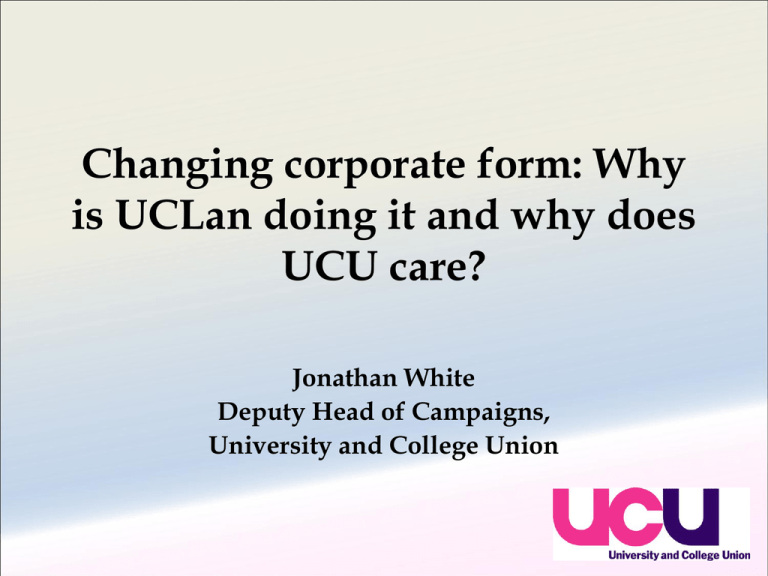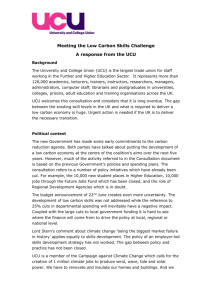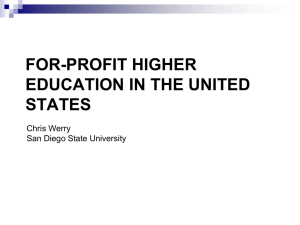For-profit higher education in the UK
advertisement

Changing corporate form: Why is UCLan doing it and why does UCU care? Jonathan White Deputy Head of Campaigns, University and College Union Overview • Why is UCLan doing this? • Why is it important? • Why is UCU opposed? “Exciting times in higher education” Wider policy context: • renewed attack on public services through the Health and Social Care Act, the Work Programme and the higher education White Paper: “Putting students at the heart of the system” “Students at the heart of the system” • Changing the form of the public subsidy from grant funding to a fee and loan system that is choking off student demand • Creation of a competitive ‘margin’ for student places that is creating a ‘squeezed middle’ of universities • Removed some of the regulatory barriers to new providers getting access to the markers of prestige – university title. • Deliberately subsidising the creation of new, for-profit providers New providers with deep pockets A new kind of animal: for-profit companies with Big Capital backers: • BPP University College – owned by Apollo • The University of Law, owned by Montagu Private Equity • Greenwich School of Management – owned by Sovereign Capital • Pearson college – owned by Pearson plc Financiers looking for new investment opportunities • The financial crash and the search for new assets • Private Equity: UK HE is a ‘Treasure Island’ • Investment Banks: ‘demand would be enormous’ Universities and the dash for cash A scramble to access new sources of capital to fund the beauty contest for students: • • • • • • • Private partnerships and Joint Ventures Outsourcing Subsidiary companies International campuses Bond issues Buyouts Changing corporate form Corporate form matters Different HEIs have different constitutions and different corporate forms: • chartered universities – broadly the Pre-92 sector • higher education companies – the majority of the post-92 universities • companies limited by guarantee – former ILEA Polytechnics and more recent new HEIs • now, with BPP, Pearson, Kaplan and the University of Law: companies limited by share. Different corporate forms give institutions different powers. What changes if UCLan becomes a CLG? • Does not have to seek Privy Council approval for fundamental changes • Loses statutory requirement to have governing board and academic council • Could dissolve or sell itself to a third party without seeking Privy Council permission • Could float a loan on the stock market • Easier to set up a for-profit subsidiary company with a private investor, controlling the university’s assets Why is this new? • Other CLGs: former ILEA Polytechnics and HEIs created after 1992 • Little evidence that it’s a stronger form of governance – London Met, anyone? • Key thing is the policy context and the movement of private capital into the sector. • This makes the move to CLG status a key stage in the hollowing out of democratic governance and the placing of charitable and public assets at the disposal of private profit. • It’s privatisation. To conclude: • UCU is opposed to this form of privatisation as it is to others. • Students are not consumers and universities are not businesses. • The corporation’s limits on management are imperfect, but valuable, instruments for asserting the interests of university stakeholders, including the public. • There is an alternative.











